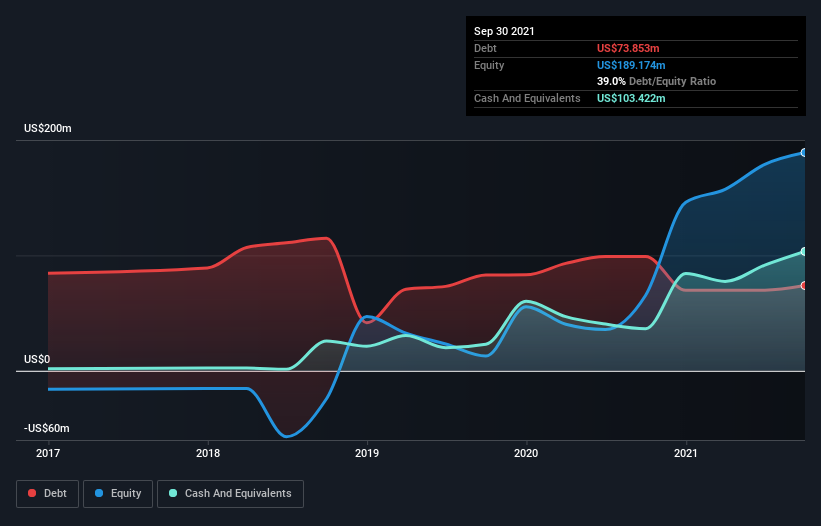- United States
- /
- Biotech
- /
- NasdaqCM:ORGO
Organogenesis Holdings (NASDAQ:ORGO) Seems To Use Debt Quite Sensibly

David Iben put it well when he said, 'Volatility is not a risk we care about. What we care about is avoiding the permanent loss of capital.' When we think about how risky a company is, we always like to look at its use of debt, since debt overload can lead to ruin. Importantly, Organogenesis Holdings Inc. (NASDAQ:ORGO) does carry debt. But should shareholders be worried about its use of debt?
When Is Debt A Problem?
Debt and other liabilities become risky for a business when it cannot easily fulfill those obligations, either with free cash flow or by raising capital at an attractive price. Part and parcel of capitalism is the process of 'creative destruction' where failed businesses are mercilessly liquidated by their bankers. However, a more common (but still painful) scenario is that it has to raise new equity capital at a low price, thus permanently diluting shareholders. Of course, debt can be an important tool in businesses, particularly capital heavy businesses. The first thing to do when considering how much debt a business uses is to look at its cash and debt together.
See our latest analysis for Organogenesis Holdings
How Much Debt Does Organogenesis Holdings Carry?
The image below, which you can click on for greater detail, shows that Organogenesis Holdings had debt of US$73.9m at the end of September 2021, a reduction from US$99.0m over a year. However, it does have US$103.4m in cash offsetting this, leading to net cash of US$29.6m.

A Look At Organogenesis Holdings' Liabilities
According to the last reported balance sheet, Organogenesis Holdings had liabilities of US$81.0m due within 12 months, and liabilities of US$100.2m due beyond 12 months. Offsetting this, it had US$103.4m in cash and US$74.6m in receivables that were due within 12 months. So its total liabilities are just about perfectly matched by its shorter-term, liquid assets.
Having regard to Organogenesis Holdings' size, it seems that its liquid assets are well balanced with its total liabilities. So while it's hard to imagine that the US$1.26b company is struggling for cash, we still think it's worth monitoring its balance sheet. While it does have liabilities worth noting, Organogenesis Holdings also has more cash than debt, so we're pretty confident it can manage its debt safely.
Even more impressive was the fact that Organogenesis Holdings grew its EBIT by 2,154% over twelve months. That boost will make it even easier to pay down debt going forward. The balance sheet is clearly the area to focus on when you are analysing debt. But it is future earnings, more than anything, that will determine Organogenesis Holdings's ability to maintain a healthy balance sheet going forward. So if you want to see what the professionals think, you might find this free report on analyst profit forecasts to be interesting.
Finally, a business needs free cash flow to pay off debt; accounting profits just don't cut it. While Organogenesis Holdings has net cash on its balance sheet, it's still worth taking a look at its ability to convert earnings before interest and tax (EBIT) to free cash flow, to help us understand how quickly it is building (or eroding) that cash balance. Over the last two years, Organogenesis Holdings recorded negative free cash flow, in total. Debt is far more risky for companies with unreliable free cash flow, so shareholders should be hoping that the past expenditure will produce free cash flow in the future.
Summing up
We could understand if investors are concerned about Organogenesis Holdings's liabilities, but we can be reassured by the fact it has has net cash of US$29.6m. And we liked the look of last year's 2,154% year-on-year EBIT growth. So we are not troubled with Organogenesis Holdings's debt use. There's no doubt that we learn most about debt from the balance sheet. However, not all investment risk resides within the balance sheet - far from it. For example, we've discovered 1 warning sign for Organogenesis Holdings that you should be aware of before investing here.
If you're interested in investing in businesses that can grow profits without the burden of debt, then check out this free list of growing businesses that have net cash on the balance sheet.
New: AI Stock Screener & Alerts
Our new AI Stock Screener scans the market every day to uncover opportunities.
• Dividend Powerhouses (3%+ Yield)
• Undervalued Small Caps with Insider Buying
• High growth Tech and AI Companies
Or build your own from over 50 metrics.
This article by Simply Wall St is general in nature. We provide commentary based on historical data and analyst forecasts only using an unbiased methodology and our articles are not intended to be financial advice. It does not constitute a recommendation to buy or sell any stock, and does not take account of your objectives, or your financial situation. We aim to bring you long-term focused analysis driven by fundamental data. Note that our analysis may not factor in the latest price-sensitive company announcements or qualitative material. Simply Wall St has no position in any stocks mentioned.
Have feedback on this article? Concerned about the content? Get in touch with us directly. Alternatively, email editorial-team (at) simplywallst.com.
About NasdaqCM:ORGO
Organogenesis Holdings
A regenerative medicine company, develops, manufactures, and commercializes products for the advanced wound care, and surgical and sports medicine markets in the United States.
Flawless balance sheet with reasonable growth potential.
Similar Companies
Market Insights
Community Narratives



